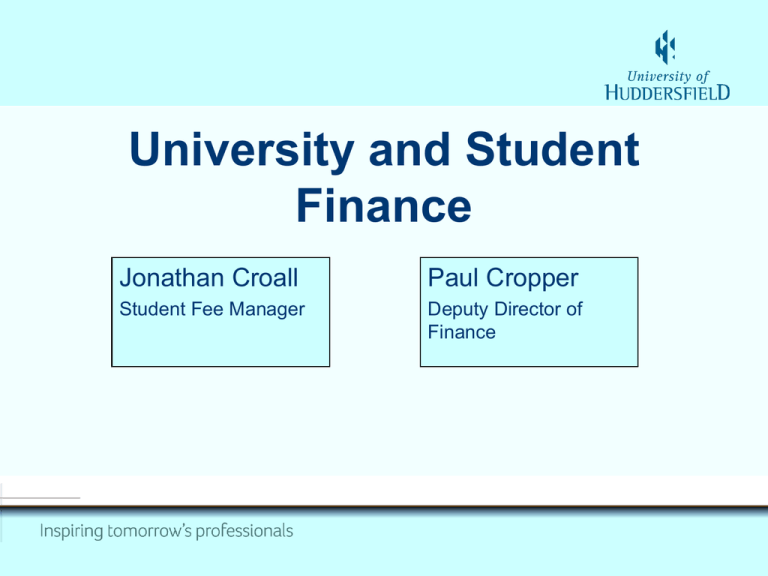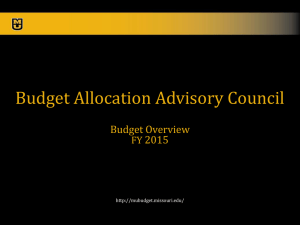Finance Induction - University of Huddersfield
advertisement

University and Student Finance Howard Croall Bolton Jonathan HeadFee of Manager Student Student Finance Paul Cropper Deputy Director of Finance Topics Part 1 – University Finances • Where does the university get its money from? • Where is the money spent? • How is money distributed within the university? • What is the financial state of the university and the sector? • What is your responsibility for finances? • What is the Transparency Review? Part 2 – Student Finances • How are students funded and what do they pay? • Where can advice and support be found? Financial Services Mission To support the recruitment and retention of students by maximising the investment of human and physical resources devoted to teaching and learning. We will achieve this by: • ensuring that the university remains financially strong • achieving best value for money in all activities • ensuring that decisions are taken within a framework where risk is acknowledged, monitored and controlled Income & Expenditure – 2010/11 Income Expenditure (before FRS 17) £m 139.0 123.5 15.5 This is the income and expenditure for the day to day running of the University, including discontinued operations. Where the money comes from? Funding Council Grants Tuition Fees and Education Contracts Research Grants and Contracts Catering and Conferences Health Authorities Other Sources Interest Receivable Total £m 61.8 51.4 3.1 1.1 12.9 7.9 0.8 139.0 Funding Council Grants Tuition Fees and Education Contracts Research Grants and Contracts Catering and Conferences Health Authorities Other Sources Interest Receivable What does the HEFCE pay per FTE student in 2011/12? Price group Depends on the price group within which a module falls and the mode of study B C D Mode £ FTS 6,239 SW (year out) 4,771 PT 6,863 FTS 4,771 SW (year out) 4,771 PT 5,248 FTS 3,670 SW (year out) 4,771 PT 4,037 What and where? What the money was spent on: Staff Staff Restructuring Depreciation Other Operating Expenses Interest Payable Total Where the money was spent: Academic Departments Academic Services Research Grants and Contracts Catering and Conferences Premises Administration and Central Services Other Staff Restructuring Total £m 73.4 0.3 3.5 38.8 2.5 118.5 Academic Departments Academic Services Research Grants and Contracts Catering and Conferences £m 60.5 17.1 3.4 1.1 13.8 17.0 5.4 0.2 118.5 Premises Administration and Central Services Other Staff Restructuring Balance Sheet at 31 July 2011 Net Assets Fixed assets Endowment investments Current assets: Debtors Investments Cash Short term creditors £135,381k £293k £14,666k £3,351k £47,094k £65,111k (£27,781k) Net Current Assets £37,330k Total Assets Less Current Liabilities £173,004k Long Term Creditors Provisions (£0k) (£309k) Pension Liability (£37,503k) Net Assets £135,192k Total Funds Deferred capital grants Endowments Reserves: Revaluation reserve I&E reserve Total Reserves £40,061k £68,129k £108,190k Total Funds Total Funds £135,192k £26,709k £293k How is the money distributed? The DevRev model is simple, straightforward and transparent. All qualifying income is topsliced to give the strategic provision [SP] and the remainder is split between schools and infrastructure. Strategic provision Schools Infrastructure How much is distributed in 2011/12? Devolved Revenue model for 2011/12: Schools Services Strategic provision 4% Reserves £60.8m £29.1m £12.8m £4.3m 57% 27% 12% 4% Allocation to schools and services in 2011/12 (Including Barnsley and Oldham activity) Schools Human & Health Art, Design & Architecture Computing & Engineering Business Applied Sciences Education & PD Music, Humanities & Media PCET Consortium £15.0m £8.3m £8.2m £8.1m £8.7m £6.3m £6.3m £3.8m Services Estates Computing & Library Finance Marketing VCO University Campuses Human Resources International Office PINS Student Services Research & Enterprise Registry £9.3m £8.0m £1.8m £1.8m £1.6m £1.5m £1.4m £1.0m £1.0m £0.8m £0.6m £0.5m Financial Security of Universities (Each institution is scored on the basis of it’s financial strength) The Security Index 2009-10 700 Lower Quartile: 240.00 Average: 329.99 Upper Quartile: 405.00 Huddersfield 2009-10, 520.00 600 Huddersfield 2008-09, 439 500 Huddersfield 2007-08, 399 Huddersfield 2006-07, 370 400 300 200 100 0 Lower Quartile Mid Range Upper Quartile Condition of the Estate (A and B represents good quality) Percentage of Estate classed as condition A or B 2009-10 100.0 90.0 Lower Quartile: 66.20% Average: 75.32% Upper Quartile: 90.00% The University of Huddersfield, 85.0 Huddersfield 07-08 & 08-09, 77.0 Huddersfield 06-07, 75.5 80.0 70.0 60.0 50.0 40.0 30.0 20.0 10.0 0.0 Lower Quartile Mid Range Upper Quartile Surpluses/(Deficits) for each institution Percentage of Historical Cost Surplus / (Deficit) to Total Income (excluding FRS17) 2009-10 25 Lower Quartile: 1.73 Average: 4.15 Upper Quartile: 7.08 20 Huddersfield 2009-10, 14.17 15 Huddersfield 2008-09, 8.02 10 Huddersfield 2007-08, 4.61 Huddersfield 2006-07, 3.79 5 0 -5 -10 Lower Quartile Mid Range Upper Quartile Staff costs as a percentage of income Percentage of Staff costs (excluding FRS17) to Total Income 2009-10 80 Lower Quartile: 51.76 Average: 54.52 Upper Quartile: 59.00 Huddersfield 2007-08, 59.32 Huddersfield 2006-07, 59.21 70 Huddersfield 2009-10, 54.54 Huddersfield 2008-09, 58.79 60 50 40 30 20 10 0 Lower Quartile Mid Range Upper Quartile Teaching grant from the Funding Council as a percentage of total income Percentage of Recurrent Teaching Grants to Income 2009-10 70 Lower Quartile: 18.00 28.07 Average: Upper Quartile: 37.42 60 Huddersfield 2006-07, 45.06 Huddersfield 2009-10, 39.49 Huddersfield 2007-08, 43.26 50 Huddersfield 2008-09, 42.03 40 30 20 10 0 Lower Quartile Mid Range Upper Quartile Historical cost surplus as a percentage of total income Historical cost surplus as a percentage of total income 14.0% University Sector 12.0% 10.0% 8.0% 6.0% 4.0% 2.0% 0.0% 2005/06 2006/07 2007/08 2008/09 2009/10 2010/11 Total staff costs as a percentage of total income 65% Total staff costs (excluding restructuring and FRS 17) as a percentage of total income Sector University 60% 55% 50% 2005/06 2006/07 2007/08 2008/09 2009/10 2010/11 Liquidity Liquidity (as days of expenditure) 200 University 150 Sector 100 50 0 2005/06 2006/07 2007/08 2008/09 2009/10 2010/11 Sector Risks • • • • • • • • Admissions International students Government funding Finances and investments Capital expenditure Pay costs Pension costs Business links Financial Context Reduced funding expected from: • • • • • HEFCE Teaching grant HEFCE Research grant NHS income TDA grant Part-time fee income Increased funding expected from: • Full-time Home & EU undergraduate fee per student • Overseas students • Research and Enterprise activity (matched by expenditure) Financial controls “To conduct its business effectively a University needs to ensure that it has sound financial management systems in place and that they are strictly adhered to…... Compliance with the financial regulations is compulsory for all staff connected with the University.” Financial controls - Responsibilities University Council Financial Services Individual Schools and Services Role of Council Responsible for: • Effective and efficient use of resources, the solvency of the University and for safeguarding its assets • Approving annual estimates of income and expenditure • Considering and approving the annual accounts These responsibilities may not be delegated. However, Council must establish a (Finance) Committee (and an Audit Committee). Also must: • make financial rules to ensure the proper administration and control of the University’s resources • cause to be kept accounts and records • approve arrangements to determine tuition and other fees Members must declare any financial interests Financial regulations – Financial control • The Vice-Chancellor is the University’s designated accounting officer and is responsible for the regulation, direction and management of the University • The Director of Finance controls day to day financial administration • The Dean/Director or Head of Service is responsible for financial management in his own area – he/she is advised by Financial Services in executing his/her financial duties and assisted by management information provided by Financial Services Financial control - Financial Services Responsible for: • Annual revenue budget and capital programme • During the year producing revised budgets • Rolling five year financial plan • Preparing financial information, monitoring and control of income and expenditure against budget • Submitting budgetary reports on all aspects of the University’s finances to University committees • Preparing financial statements and other financial returns and reports • Ensuring that the university maintains satisfactory financial systems Financial control - Schools & Services Responsible for: • Economic, effective and efficient use of resources • Safeguarding assets allocated to them • Producing detailed budgets using the resources made available to them • Control of income and expenditure within the agreed budget including effective day to day monitoring • Reporting significant departures from agreed budgets • Establishing and maintaining clear lines of responsibility within the school/service for all financial matters. Where resources are devolved to budget holders they are accountable to the dean/director or head of service for their own budget Financial regulations – What do they contain? Guidance provided on: • Financial Control • Income and banking • Research grants and contracts • Expenditure • Salaries and wages • Assets • Other (e.g. Risk management) Financial regulations – Operational issues (1) • Cash Receipts – all monies received must be recorded daily and paid into Financial Services at least weekly • Collection of debts – all invoices must be raised promptly on official University invoices. Financial Services are responsible for implementing credit arrangements and taking swift and effective action to collect overdue debts. • Petty cash – items less than £10 should be paid by purchasing card. If not possible use petty cash. Receipts or vouchers must be obtained. Each school/service is responsible for safe keeping of cash. Financial Services agree total available to each school/service and reimburse funds before total amount has been spent. Financial regulations – Operational issues (2) • Ordering goods – use orders produced from the University’s finance system (except petty cash, purchasing cards) • Tendering - £3k-£25k (quotes); £25k upwards (tenders); >£139,893 (EU threshold tenders) • Payment of invoices – weekly payment run by automatic transfer into suppliers bank accounts. The University’s terms of payment are 30 days from receipt of invoice • Employees’ expenses – must be in accordance with Expenses and Benefits Procedures Manual, authorised by line manager. Weekly payments into account of employee Risk management Review process: • Corporate risks identified • These risks are considered by the Audit Committee before going to Council • The risks are included with the strategic planning contextual document circulated to Deans and Directors • Deans and Directors identify the key risks they face and these are included within their planning document • Corporate and local risks are reviewed during the year Finance policies and procedures Available on the Financial Services pages of the University web site: • Financial regulations • Master forms • Fraud and corruption response plan • Expenses and benefits procedures manual • Guidance notes (budgets, etc…) • Treasury management policy • Insurance guide Fraud and Corruption Plan The plan defines the process to enable the University to: • • • • • • • • • • Prevent further loss Notify the Police of any potential criminal act Establish and secure evidence necessary for disciplinary action Notify HEFCE, if appropriate Keep all personnel with a need to know suitably informed Inform the police and establish lines of communication with them Assign responsibility for investigating the incident Review the reasons and prevent a recurrence Recover losses Take appropriate disciplinary action Transparency Review at Huddersfield • Costing the activities of the University of Huddersfield • Process is driven via a web site http://tranrevw.hud.ac.uk. • Assistance available from the costing team and school/service champions • Objective is to minimise the burden on staff • Full economic costing Financial Support for Students Academic Year 2011/12 Onwards Tuition Fee Rates 2011/12 • Fees of up to £3,375 from 2011/12 are to be charged in respect of full-time courses at HEFCE funded institutions. • Excludes NHS, TDA, post-grad, part-time courses. • Part-time fees are set by each university for each course, usually pro-rata to the standard full-time fee. Key Point • Parents don’t pay tuition fees. • Students don’t pay tuition fees. • Graduates pay tuition fees. Tuition Fees • Universities can charge up to £3,375 per year. • No student now needs to pay up front. • Tuition Fee Loans to cover cost – administered by the government. • Tuition fee income helps the University to improve facilities and offer a better student experience. Student Financial Assistance • Means tested Maintenance Grants of up to £2,906. • Means tested University Bursaries. • Student Maintenance Loans. • Tuition Fees of up to £3,375 – No Means Testing. Grants – for living expenses • Means tested non repayable grant of up to £2,906 from the government. • Each university will have to pay a minimum £338 bursary to students that receive the full grant. • Huddersfield offers up to £500 means tested bursary Student Maintenance Loans • Available to all full time students • Elsewhere - £4950 • Living at Home - £3838 • The amount of loan you will be eligible to apply for will depend on the amount of state grant you receive. Eg. The loan will be reduced by £0.50 for every £1 of grant the student receives up to a maximum reduction of £1453. Financial Support (non-repayable grants) Government Grant Additional support from Huddersfield Government Grant For students with family income up to £25,000. Partial grants available for students with family income up to £50,020 Students with family income up to £25,000 per year £2,906 £500 per yr Paying it Back Income Each Year Up to £15,000 Monthly repayment Repayment as a Percentage of Income 0 0 £16,000 £7.50 0.6 £17,000 £15 1.1 £18,000 £22.50 1.5 £19,000 £30 1.9 Income of Huddersfield students or their families Income distribution University of Huddersfield 2007-08 (Student Loan Company data) 70.0 60.0 Cumulative percent 50.0 40.0 30.0 Dotted purple line indicates anticipated grant eligibility in 2008-09 20.0 10.0 0.0 0 2.5 5 7.5 10 12.5 15 17.5 20 22.5 25 27.5 30 32.5 35 Residual incom e £k 37.5 40 42.5 45 47.5 50 52.5 55 57.5 60 Part-time students Will generally pay at half the full-time rate (of £562.50 per 20 credit module) ie £300 per 20 credit module. Currently these fees continue to be paid “up-front” (ie are not included in the new deferred fees regime for full-time students). 2012/13 onwards • Changes to the student support system • We are charging £7950 per year for our undergraduate degree courses. • Tuition Fee Loan covers all the fees • Student Loans and Grants available as before • New National Scholarship Scheme • Students repay after graduation – threshold rises to £21k Points to remember • Students don’t pay fees up front • Students from lower income families will be better off while they study • Graduates earn an average income premium of 40% over a lifetime • Not a debt – an investment! Useful contacts – internal/external • Student Fee and Bursary Manager [U] – Jonathan Croall 01484 472536 • Inland Revenue www.inlandrevenue.gov.uk/taxcredits • DfES www.dfes.gov.uk/studentsupport • Teacher Training 0845 6000 992 www.canteach.gov.uk • Student Loans Company 0800 405 010 www.slc.co.uk Disabled Students’ Allowances 0800 731 9133 www.dfes.go.uk/studentsupport/formsandguid es/index.shtml • Child Tax Credit helpline 0800 500 222 • NHS Student Grants Unit 01253 655655 • National Union of Students www.nusonline.co.uk • Scholarship Search UK www.scholarship-search.org.uk • Educational Grants Advisory Service www.egas-online.org.uk Student Support Manager [U] – Jean Adams-Mack 01484 473201 www.hud.ac.uk/finance/index.htm Student Income Manager [U] – Kirsty White 01484 472569 • Want to know more about university finances? Information is available from: • University web site (www.hud.ac.uk/finance/index.htm) • HEFCE web site (www.hefce.ac.uk) – A guide to UK HE (http://www.hefce.ac.uk/pubs/hefce/2009/09_32/) – How HEFCE allocates its funds (http://www.hefce.ac.uk/pubs/hefce/2008/08_33/) • Student Finance Office (level 8) • Financial Services Department (level 8) • Published accounts and other financial reports








